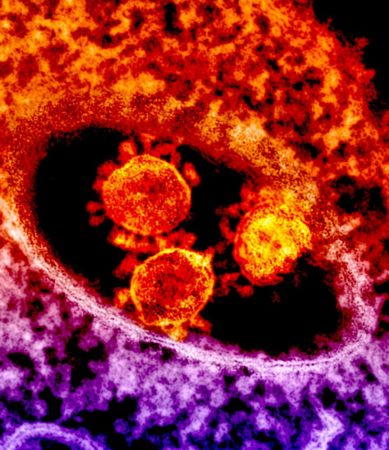
RevImmune announces Phase II trial of T-Cell growth factor CYT107 for COVID-19
by CM Staff
Preparations for the trial are under way in the U.S., with potential to expand to Canada

Coronavirus particles. PHOTO: National Institutes of Health, via Creative Commons
BETHESDA, Md. — RevImmune, a biotechnology company developing CYT107 immune therapy for infectious diseases and cancer, announced June 29 it has launched the “ILIAD” Phase II trial for treatment of COVID-19.
Many COVID-19 clinical trials have focused on decreasing the hyper-inflammatory phase that often occurs in COVID-19 patients and can cause substantial damage. However, there is a growing recognition that the hyper-inflammatory phase is temporary, and often followed by a stage of immune exhaustion and T-cell loss. Therapy with CYT107 is designed to increase the number of immune T cells and correct the immune exhaustion.
CYT107 is a form of the master growth factor for human T cells: Interleukin-7 (IL-7). CYT107 has been administered to over 440 patients in clinical trials and is known to substantially increase the number and diversity of T cells, including in patients in the ICU with low and exhausted T cell levels from overwhelming infections.
The “ILIAD” Phase II trial of CYT107 for COVID-19 was selected by the U.K. National Health System for designation as an “urgent public health national priority.” The trial opened in the U.K. in mid-May and is enrolling patients at 10 sites across the U.K. The trial opened in France and Belgium in early June. Preparations for the trial are under way in the U.S., with potential to expand to Canada.
The effects of CYT107/IL-7 in restoring immune levels are both rapid and durable, according to RevImmune. The treatment involves just two administrations per week for 2-4 weeks. In clinical trials to date, the effects have been seen within days of beginning administration of CYT107, and have been seen to continue for up to a year after the 2-4 week administration. This lasting effect of CYT107 to maintain the increase in immune cells over time is important in preventing late infections that are a frequent cause of patient relapse and hospital readmission.